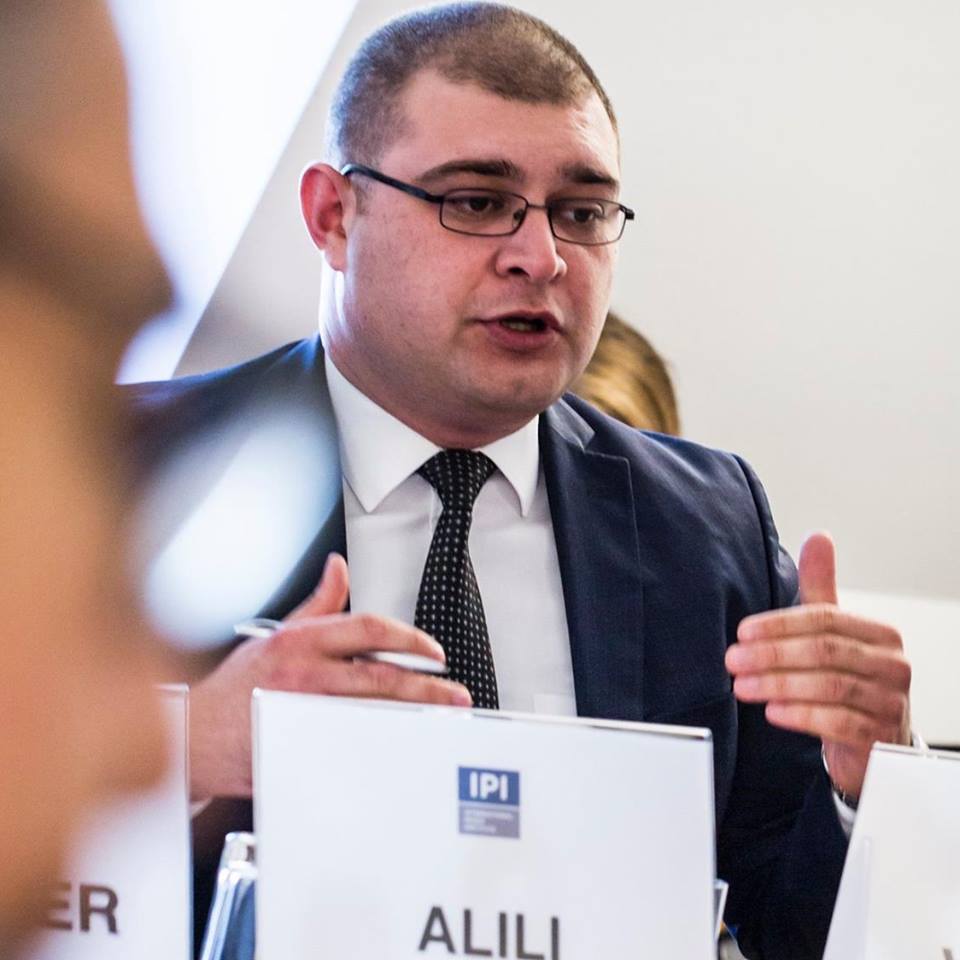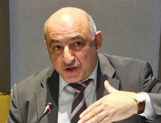
On Karabakh the Focus should Be on Confidence-Building Measures  By Benyamin Poghosyan, PhD, Executive Director, Political Science Association of Armenia
By Benyamin Poghosyan, PhD, Executive Director, Political Science Association of Armenia
The Karabakh conflict settlement process continues to interest regional security pundits. Yet, despite the growing optimism after the "Velvet revolution" in Armenia, in recent months, the prevailing mood has been more pessimistic. The two meetings between the leaders of Armenia and Azerbaijan at the beginning of 2019, and negotiations at the level of the foreign ministers, did not result in any breakthrough. The significant decrease in the number of incidents along the line of contact and on the Armenia-Azerbaijan international border since October 2018 is a positive step, although one can also see recent increases in clashes resulting in casualties on both sides. READ MORE
- EGF Editor |
Published on EGF: 16.10.2019
| Security
-
Azerbaijan in 2020: Recent Developments and Future Foreign Policy Challenges  By Ahmad Alili, Head of Research, Caucasus Policy Analysis Center, Baku
By Ahmad Alili, Head of Research, Caucasus Policy Analysis Center, Baku
At the dawn of the unipolar international system – following the collapse of the Communist system in Eastern Europe and the South Caucasus – “the end of history” was announced. It was expected that the benevolent hegemony of the United States would last for many decades to come – liberal values and democracy would be spread to each corner of the world. The events of recent years and the chaos in the international order shows that the world is transforming from a unipolar world into a multipolar one. This transformation process has its reverberations in regions such as the South Caucasus. READ MORE
- EGF Editor |
Published on EGF: 16.10.2019
| External Relations
-
Perspectives of EAEU – EU Relations  By Benyamin Poghosyan, PhD, Executive Director, Political Science Association of Armenia
By Benyamin Poghosyan, PhD, Executive Director, Political Science Association of Armenia
The relations (or the lack thereof) between the Eurasian Economic Union (EAEU) and European Union (EU) are one of the key topics of debate between international relations pundits. There are different assessments regarding the current situation and the way forward. However, almost all experts agree that the key issue here resides in the relationship between Russia and the West (US/EU/NATO). As long as this relationship is at its lowest point since the end of the Cold War, there is almost no chance of any substantial cooperation between these two organizations. READ MORE
- EGF Editor |
Published on EGF: 07.10.2019
| External Relations
-
Armenia and the US: Time for New Thinking  By Eduard Abrahamyan, Senior Fellow with the London-based Institute for Statecraft
By Eduard Abrahamyan, Senior Fellow with the London-based Institute for Statecraft
Armenia’s 2018 Velvet Revolution raised hopes for a reinvigoration of the country’s decades-long partnership with the U.S. However, this relationship remains stagnant, despite the visit of a U.S. delegation led by National Security Advisor John Bolton in October 2018 and the subsequent visit of Deputy Assistant Secretary George Kent to Yerevan in May 2019, resulting in the formal elevation of Armenia’s relations with the U.S. to the level of “strategic dialogue.” Moreover, Yerevan’s decision to dispatch a military-humanitarian mission to Syria remains an irritant in its interaction with Washington.
READ MORE
- EGF Editor |
Published on EGF: 07.10.2019
| External Relations
-
China's Underestimated Strategic Engagement in Central Asia  By Armine Arzumanyan, Graduate of Renmin University, PR of China
By Armine Arzumanyan, Graduate of Renmin University, PR of China
China's main goals in Central Asia may not directly hint at the region's long-term strategic importance, but the outcomes of China's engagement in the region clearly show concrete signs of it. China's emergence as the dominant actor in the region’s energy and infrastructure sectors, along with its growing presence as the lender of choice for Central Asia, has had deep consequences as Beijing has quietly cultivated the defense component of its newfound presence in region. Though relatively little studied, China's energy-infrastructure-defense tridimensional approach is of immense importance. READ MORE.
- EGF Editor |
Published on EGF: 02.10.2019
| External Relations
-
Gulf Tensions May Spill Over into the Caucasus  By Benyamin Poghosyan, PhD, Executive Director, Political Science Association of Armenia
By Benyamin Poghosyan, PhD, Executive Director, Political Science Association of Armenia
The September 14th attacks against Saudi Arabia's oil facilities have dangerously increased tensions in the Middle East. Regardless of the author of these actions - the Houthi rebels from Yemen or the Islamic Revolutionary Guard Corps using Iraqi or Iranian territories - a clear message was sent to the Gulf monarchies and the US: Iran on its own or through its proxy forces is capable of inflicting serious damage to the Gulf States’ vital interests, and the "maximum economic pressure" campaign led by the US since May 2018 has as yet failed to change Iranian regional policy. READ MORE
- EGF Editor |
Published on EGF: 01.10.2019
| Security
-
Armenia–China: Strategic Partnership for Mutual Benefits  By Benyamin Poghosyan, PhD, Executive Director, Political Science Association of Armenia
By Benyamin Poghosyan, PhD, Executive Director, Political Science Association of Armenia
Armenia and China are both among the ancient civilizations of human history. They share millennia of mutual contacts via the ancient Silk Road. However, history is not the only thing which unites the two nations. Both Armenians and Chinese put enormous emphasis on protecting their national identities and traditions. Of course, this does not mean that Armenia and China are not interested or involved in the current wave of globalization. READ MORE
- EGF Editor |
Published on EGF: 24.09.2019
| External Relations
-
Pashinyan's New Tactic: 'Tougher in Public, Softer at the Negotiation Table'  By Ahmad Alili, Head of Research, Caucasus Policy Analysis Center, Baku
By Ahmad Alili, Head of Research, Caucasus Policy Analysis Center, Baku
The next meeting between the Ministers of Foreign Affairs of Armenia and Azerbaijan will be held in the upcoming days, most likely during the UN General Assembly in New York. This is the first meeting following Armenian Prime Minister Nikol Pashinyan's "Unification" speech on 5 August in Nagorno-Karabakh, which contained an unprecedented hardline rhetoric, hurting both 'Track1' and 'Track2' processes, which shocked Baku. Following the speech, Azerbaijani officials called for a reaction from the OSCE Minsk Group co-chairs. READ MORE
- EGF Editor |
Published on EGF: 24.09.2019
| Security
-
Turkey's Strategic Balancing Act between Russia and the United States  By Benyamin Poghosyan, PhD, Executive Director, Political Science Association of Armenia
By Benyamin Poghosyan, PhD, Executive Director, Political Science Association of Armenia
Turkey is successfully managing to implement a strategic balancing act in its relations with the US and Russia. Other regional actors may look at this policy and take good note.
Since the summer 2016 Turkish foreign policy has been facing a tough challenge: how to balance its growing partnership with Russia with its relations with the US? The rising tensions between the US and Russia, as well as the widening gap between the US and Turkish interests in Syria, the refusal by Washington to extradite cleric Fetullah Gulen, and simmering doubts among the Turkish leadership regarding the possible involvement of the US in the 2016 July military coup attempt, make this task even more daunting. READ MORE
- EGF Editor |
Published on EGF: 16.09.2019
| External Relations
-
Armenia-Azerbaijan: Searching for New Models of Dialogue  Joint Study with “Yeni nesil”, coordinated by Boris Navasardian, President, Yerevan Press Club
Joint Study with “Yeni nesil”, coordinated by Boris Navasardian, President, Yerevan Press Club
The main purpose of this study was to consider the feasibility and prospects of revival of the Track-2 diplomacy and the development of appropriate recommendations. Although it was conceived and supported by the US government even before the political changes in Armenia, its relevance was confirmed by the intensification of the dialogue at the official level between Yerevan and Baku in the summer of 2018. Certain characteristics of the renewed interest in the informal communication were revealed during the visit to Yerevan of the Azerbaijani journalist Shahin Hajiyev, in February 2019, and by the interest of Armenian journalists to visit the neighboring country. READ MORE
- EGF Editor |
Published on EGF: 16.09.2019
| External Relations
-
